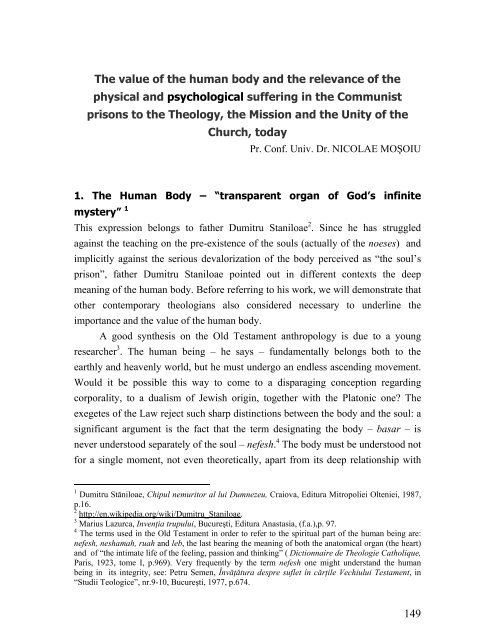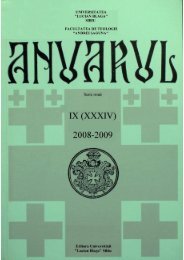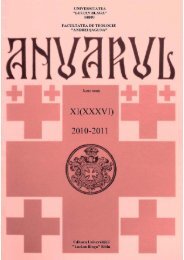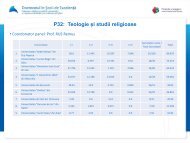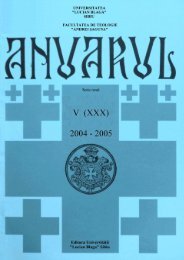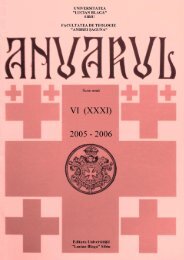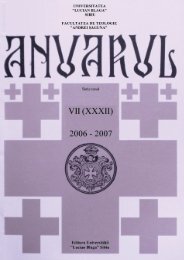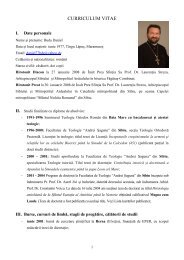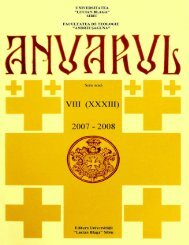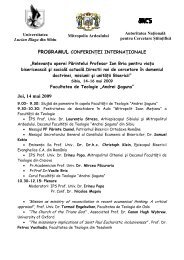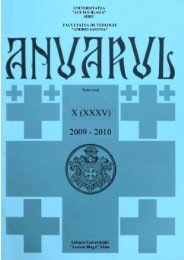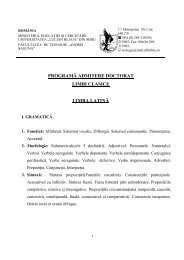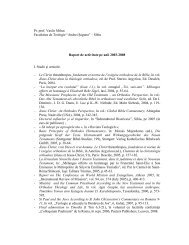- Page 3:
ANUARUL ACADEMIC2003- 2004
- Page 6 and 7:
Descrierea CIP a Bibliotecii Naţio
- Page 9 and 10:
TEOLOGIE BIBLICĂIstorie şi teolog
- Page 11 and 12:
moral. 10 În ediţiile Bibliei din
- Page 13 and 14:
Valoarea istorică şi teologică
- Page 15 and 16:
1 Macabei: Între ideologie hasmone
- Page 17 and 18:
Prin afirmaţia că Dumnezeu a adus
- Page 19 and 20:
sunt ucişi. Cruzimea persecutorilo
- Page 21 and 22:
TEOLOGIE ISTORICĂCăderea Constant
- Page 23 and 24:
Cernomen pe râul Mariţa, la 26 se
- Page 25 and 26:
pe împărat. El nu spune -împăra
- Page 27 and 28:
Biserica „Santa Maria del Fiore
- Page 29 and 30:
Constantin Dragases a refuzat să
- Page 31 and 32:
Dimitrie Paleologul, despotul Pelop
- Page 33 and 34:
Istoricul Dukas relatează că sult
- Page 35:
1965, trad. rom. de A. Elian, ed. a
- Page 38 and 39:
1. Motivele întrunirii Adunării C
- Page 40 and 41:
Consfătuirea de la Sinaia, din 24-
- Page 42 and 43:
Pregătiri pentru o nouă legislatu
- Page 44 and 45:
doi arhierei ai noştri unirea, apo
- Page 46 and 47:
În al doilea număr din 1920 al pu
- Page 48 and 49:
Cu alte cuvinte, Legea Sinodală di
- Page 50 and 51:
de conservatorismul neamului nostru
- Page 52 and 53:
Vechiul Regat şi din provinciile a
- Page 54 and 55:
2. Propunerile lui Miron Cristea pr
- Page 56 and 57:
dacă s-au susţinut, au rămas tar
- Page 58 and 59:
hotărârile şi sentinţele sale f
- Page 60 and 61:
îndeplini Sinodul episcopesc, ca s
- Page 62 and 63:
În ceea ce privea Mitropolia, Miro
- Page 64 and 65:
„Această trifurcare este greoaie
- Page 66 and 67:
„Eparhia o conduce chiriarhul. El
- Page 68 and 69:
canonice ale Sinodului nu se pot ş
- Page 70 and 71:
Drepturile conferite de Statutul Or
- Page 72 and 73:
Mathäus. În anii 1765-1766 s-a co
- Page 74 and 75:
şi o fată. Primul fiu, Mihail, a
- Page 76 and 77:
susţinători, chiar fiul său Grig
- Page 78 and 79:
Împrejurările în care Klenze a a
- Page 80 and 81:
Portretele au fost realizate în 18
- Page 82 and 83:
1866) şi au fost supravegheate în
- Page 84 and 85:
statului român, Capela rămânând
- Page 86 and 87:
Facultatea de Teologie din Bucureş
- Page 88 and 89:
în cadrul Consiliului Central Bise
- Page 90 and 91:
multe articole şi recenzii pentru
- Page 93 and 94:
Teologie sistematicăSfântul Grigo
- Page 95 and 96:
scrierilor Sfântului Grigorie Pala
- Page 97 and 98:
între Tracia şi Macedonia, unde a
- Page 99 and 100: puţin după 1355 acelaşi Filotei
- Page 101 and 102: Palama atinge maturitatea duhovnice
- Page 103 and 104: e mama atenţiei şi a rugăciunii,
- Page 105 and 106: safirului sau culorii cerului» 30
- Page 107 and 108: Între ucenicii pe care Grigorie Pa
- Page 109 and 110: ucenicului său, sfântul Dorotei,
- Page 111 and 112: vadă adoptată la Athos şi Viaţa
- Page 113 and 114: urmăreşte destinul trupului furat
- Page 115 and 116: Athos şi în regiunile limitrofe.
- Page 117 and 118: Triumful chinovialismului la Athos
- Page 119 and 120: potrivit biografului Filotei Cuvân
- Page 121 and 122: Hristos, şi coincidenţa fecioriei
- Page 123 and 124: un corb ca Ilie, ci de un înger (P
- Page 125 and 126: aţiunea şi gândirea nu pot înţ
- Page 127 and 128: Bisericii (J. Meyendorff, G. Mantza
- Page 129 and 130: drept „Sulul” (svitok) 86 . Dup
- Page 131 and 132: ulterior în cele 150 de capitole,
- Page 133 and 134: faptul ca dezbaterea despre relaţi
- Page 135 and 136: cercetători: filozoful grec Yannis
- Page 137 and 138: lui Dumnezeu (§ 55-57). Iubirea de
- Page 139 and 140: Există trei vieţi şi trei morţi
- Page 141 and 142: pătimeşte e mintea stârnită pri
- Page 143 and 144: pe pământ, omul îndumnezeit astf
- Page 145 and 146: Această variantă de isihasm pentr
- Page 147 and 148: patimilor depusă peste minte care
- Page 149: prudenţă (§ 3). Ziua de odihnă
- Page 153 and 154: speaks about the salvation of the s
- Page 155 and 156: The word suflet (soul) comes from t
- Page 157 and 158: This means that humanity is the mos
- Page 159 and 160: unexpected possible answer to the a
- Page 161 and 162: “One remained there for ten days.
- Page 163 and 164: It is the one who needs to be fed b
- Page 165 and 166: Speaking about the tortures the Chr
- Page 167 and 168: It is a spiritual force - a force o
- Page 169 and 170: and with two cannons on each side,
- Page 171 and 172: that they saw the corpses, but they
- Page 173 and 174: Thus, we can see that according to
- Page 175 and 176: According to Fr. Steinhardt, the fe
- Page 177 and 178: almost self-evident. We speak non o
- Page 179 and 180: Dealing with the origin and content
- Page 181 and 182: exclusively a missiology “from ab
- Page 183 and 184: Antropologia şi etica procreaţiei
- Page 185 and 186: faţă de rata totală a avorturilo
- Page 187 and 188: desigur, loc în revistele centrale
- Page 189 and 190: aport cu ceea ce se consideră a fi
- Page 191 and 192: Pentru tema de faţă analogul unei
- Page 193 and 194: Dacă avem în vedere cele două co
- Page 195 and 196: Dintr-o apreciere făcută la modul
- Page 197 and 198: moravurile lumii antice, în mijloc
- Page 199 and 200: 4.3.2.3. Dincolo de moarte: nestric
- Page 201 and 202:
Nu numai amploarea covârşitoare a
- Page 203 and 204:
Spiritualitatea secolelor al IV-lea
- Page 205 and 206:
mai mare măsură neîntemeiate gra
- Page 207 and 208:
ilustrată în descoperirile slavei
- Page 209 and 210:
din Iezechiel capitolul 1”. 14 A
- Page 211 and 212:
ideilor înaintaşilor ce aveau o c
- Page 213 and 214:
pasibil de sentinţele sinodale pen
- Page 215 and 216:
sigur că Sfântul Diadoh l-a cunos
- Page 217 and 218:
autonomă a faptei bune sau a rugă
- Page 219 and 220:
Elemente ale messalianismului, dar
- Page 221 and 222:
Bizanţ 52 şi chiar în Roma. 53 P
- Page 223 and 224:
pelagianismului la Roma, a răspuns
- Page 225 and 226:
expresii care vor determina în Apu
- Page 227 and 228:
Sfântul Diadoh, de scaunul Romei.
- Page 229 and 230:
Prezenţa messalienilor în Asia Mi
- Page 231 and 232:
atunci, practic, am avea o dovadă
- Page 233 and 234:
ăspândesc atât în Siria cât ş
- Page 235 and 236:
duhovniceşti 103 , precum şi alte
- Page 237 and 238:
Sinodului din 426 de la Constantino
- Page 239 and 240:
antropologică a lui Clement al Ale
- Page 241 and 242:
domeniu în care pronia şi lucrare
- Page 243 and 244:
Răspunzând messalianismului profe
- Page 245 and 246:
ResuméLa présente étude analyse
- Page 247 and 248:
Creaţii nemuritoare în istoria Bi
- Page 249 and 250:
profesor de teologie, benedictinul
- Page 251 and 252:
considerat că, titlul lucrării ar
- Page 253 and 254:
se află, fie în colecţii partico
- Page 255 and 256:
Tot aici se cuvine să amintim şi
- Page 257 and 258:
nu a mai putut fi realizat, datorit
- Page 259 and 260:
oprindu-se cu predilecţie asupra m
- Page 261 and 262:
atrage atenţia latinilor că, purc
- Page 263 and 264:
în întregime istoriei sectei paul
- Page 265 and 266:
ilustrează diverse împrejurări f
- Page 267 and 268:
gândurilor exprimate. Cele trei od
- Page 269 and 270:
O altă categorie este cea a „ră
- Page 271 and 272:
crede în adevăratul Hristos, ci
- Page 273 and 274:
perioada primului său patriarhat (
- Page 275 and 276:
această privinţă. Majoritatea î
- Page 277 and 278:
ZusammenfassungDas reiche literaris
- Page 279 and 280:
Comunitatea bisericească şi condi
- Page 281 and 282:
în legătură cu cea hristologică
- Page 283 and 284:
putut el impune ca religie. Tendin
- Page 285 and 286:
Răspunsul care decurge din credin
- Page 287 and 288:
Desigur, acest lucru poate fi perce
- Page 289 and 290:
Originea separaţiilor din lumea cr
- Page 291 and 292:
Pespective antropologice pentru o T
- Page 293 and 294:
din aspectele derivate din această
- Page 295 and 296:
omul îşi găseşte prin aceasta c
- Page 297 and 298:
poartă în sine asemănarea şi pe
- Page 299 and 300:
om şi mai multe decât cele spuse,
- Page 301 and 302:
Existenţa omului stă sub semnul d
- Page 303 and 304:
Împlinirea ipostatică a naturii u
- Page 305 and 306:
Persoana ca mod de subzistenţă a
- Page 307 and 308:
mult sau mai puţin la urcuşul spi
- Page 309 and 310:
Teologie practicăIerarhia în epoc
- Page 311 and 312:
armonios şi bine rânduit faţă d
- Page 313 and 314:
voinţă 14 . Numai din analiza exe
- Page 315 and 316:
2,25), ei nu sunt apostoli în în
- Page 317 and 318:
fie mai mici în har şi putere. Pe
- Page 319 and 320:
Regi 5,1,3 pe care le reproduce tex
- Page 321 and 322:
exprimau o realitate neschimbătoar
- Page 323 and 324:
Kvhrugma şi dvogma în gândirea S
- Page 325 and 326:
euhologice la sfârşitul secolului
- Page 327 and 328:
liturgică ecclesială cu învăţ
- Page 329 and 330:
Liturghiei, cât şi a unei libert
- Page 331 and 332:
eferitoare la paternitatea vasilian
- Page 333 and 334:
cuvinte: „Cu siguranţă că pe b
- Page 335 and 336:
celui atribuit Sfântului Ioan Gur
- Page 337 and 338:
RAPOARTE DE ACTIVITATE ŞTIINŢIFIC
- Page 339 and 340:
Pr. Conf. Univ. Dr. VASILE GRĂJDIA
- Page 341 and 342:
• Responsabil în colaborarea din
- Page 343 and 344:
Pr. Lect. Univ. Dr. IRIMIE MARGAA
- Page 345 and 346:
11. Preocupările canonice ale Mitr
- Page 347 and 348:
3. „Profetul Ilie în exegeza pat
- Page 349 and 350:
Participări la programe de cerceta
- Page 351 and 352:
7. „Islamul şiit. Originile unei
- Page 353 and 354:
3. Când şi de ce a fost depus Sf
- Page 355 and 356:
DOCTORATE PROMOVATE ÎN ANUL UNIVER
- Page 357 and 358:
CURSURILE PASTORALE ŞI DE ÎNDRUMA
- Page 359 and 360:
ACTIVITATE ADMINISTRATIV-GOSPODĂRE
- Page 361 and 362:
CONDUCEREA UNIVERSITĂŢII „LUCIA
- Page 363 and 364:
CONDUCEREA FACULTĂŢII DE TEOLOGIE
- Page 365 and 366:
PERSONALUL DIDACTIC, AUXILIAR ŞI A
- Page 367 and 368:
STUDENŢI LA CURSURILE DE LICENŢĂ
- Page 369 and 370:
39 Puchi Gheorghiţă Adrian Braşo
- Page 371 and 372:
10 Ciobotaru Marius Dorin Braşov,
- Page 373 and 374:
PREOŢI ŞI ALŢII1 Brădean Bogdan
- Page 375 and 376:
20 Trică Claudiu Brăila, BrăilaA
- Page 377 and 378:
3 Petrovai Măria Claudia Bârsana,
- Page 379 and 380:
17 Tudor Verza Cornelia Sibiu, Sibi
- Page 381 and 382:
32 Tudor (Stănilă) Mariana Ocna S
- Page 383 and 384:
STUDENŢII DE LA CICLUL DE STUDII M
- Page 385 and 386:
DOCTORANZIIÎNMATRICULAŢI ÎN ANUL
- Page 387 and 388:
CUPRINSTEOLOGIE BIBLICĂPr. Lect. U


